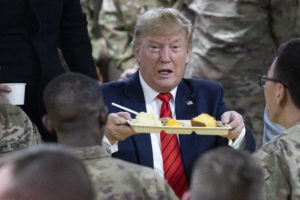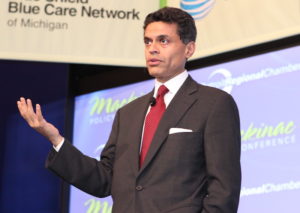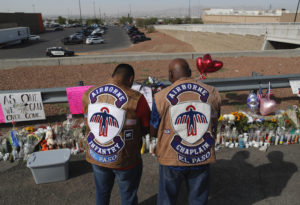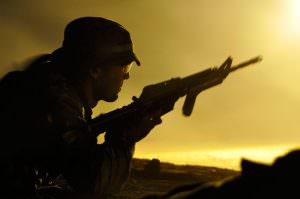The Egyptian Army: Question Marks
In attempting to persuade Egyptian President Hosni Mubarak to leave the scene, Washington desperately wants to avoid further radicalization on the streets of Egypt and, above all, to ensure that the Egyptian army remains unscathed.Washington desperately wants to avoid further radicalization on the streets of Egypt and, above all, to ensure that the Egyptian army remains unscathed.
In attempting to persuade Egyptian President Hosni Mubarak to leave the scene, Washington desperately wants to avoid further radicalization on the streets of Egypt and, above all, to ensure that the Egyptian army remains unscathed. That interest, of course, coincides with the aim of Egypt’s top brass.
The generals are intent on continuing to exercise power behind the scenes — as they have for decades.
The announcement that the army would refuse to take up arms against the people was part of Washington’s game plan. It undercut Mubarak and prevented him from attempting a bloody showdown that could have been disastrous — for the people and the army. In fact, the Egyptian military made that same announcement in 1977, when it was called in to quell riots after President Anwar Sadat announced cuts in basic food subsidies. The army refused to intervene unless the subsidies were re-established. Sadat restored the subsidies.
That doesn’t mean that the army would be willing to step aside for whatever the will of the people turns out to be. Perhaps the military could be assured that it could remain the nation’s guardian, as in Turkey. What are the political limits the army would accept?
Of course, the army is not monolithic. Its ranks are filled with hundreds of thousands of conscripts, drawn from the most humble levels of society. It has traditionally been the most important means of socializing the lower classes, inculcating them with a sense of pride and patriotism. Indeed, the 1971 constitution says that the Egyptian army shall “belong to the people.” This sentiment was made dramatically clear by the iconic images of soldiers shaking hands and embracing the demonstrators, even allowing them to paint slogans on their battle tanks.
How then to explain the fact that on Wednesday in Cairo organized bands of armed thugs were reportedly allowed to pass through military checkpoints to attack the anti-Mubarak crowds, while the military stood aside and watched.
That tactic makes eminent sense from the point of view of generals determined to keep themselves from the abyss. Now that Mubarak has said he won’t run for another term, the generals would like the people to return obediently to their homes. The military will oversee things now, thanks. Only the people won’t go. They don’t trust Mubarak. But, since the army doesn’t at this point want to endanger its own future by using bloody force, others are being allowed to do the dirty work. The military will keep its hands clean, and pretend it has no responsibility for the bloodshed.
So far, the tactic hasn’t worked: The people have refused to back down.
The top military ranks have concerns other than just protecting their own institution. They’re also worried about their own skins. They can never forget the lurid spectacle of Iranian generals being executed in the aftermath of Khomeini’s revolution in Iran. Iran also demonstrated that a radical revolution means a radically transformed military, with the traditional army shunted aside. (Egypt’s generals have a constant reminder of that lesson nearby: The Shah of Iran is buried in a Cairo mosque.)
Under Mubarak, the top military ranks have also enjoyed a pampered existence in rambling developments such as Cairo’s Nasr City, where officers are housed in spacious, subsidized condominiums. They enjoy other amenities the average Egyptian can only dream of, such as nurseries, schools and military consumer cooperatives featuring domestic and imported products at discount prices.
One of the most indulged divisions is the Egyptian Republican Guard, responsible for defending Cairo and key government institutions. They are under the control of the minister of defense. It is apparently the only significant military unit allowed in central Cairo, apart from the intelligence service’s military branch. Its ranks are filled primarily by highly trained, highly motivated volunteers rather than conscripts. They are rewarded with bonuses, new cars and subsidized housing.
The Guard was created in 1952 as a kind of Praetorian Guard by Gamal Nasser to protect the presidency. Do its members still view that as their main mission today?
We’re not just talking about official perks. Many of Egypt’s military brass are notoriously corrupt. It was military land, for instance, that was sold by the generals to finance some major urban developments near Cairo — with little if any accounting.
The military also presides over 16 sprawling factories that turn out not just weapons, but an array of domestic products from dishwashers to computers to medical diagnostic equipment. The military’s farms produce enough food to feed its ranks with plenty left over to sell to civilians.
The justification for all this nonmilitary activity is that the army is just more efficient than civilians. But that’s hard to prove since the military’s operations are off the books. Many civilian businessmen complain that competing with the military is like trying to compete with the Mafia.
The U.S. also has a $1.3 billion carrot dangling in front of the Egyptian army. That annual American military aid to Egypt has allowed the Egyptian officers to get their hands on lots of nifty weapons — as we’ve seen over the past few days in and over downtown Cairo.
The generals realize there is no way the U.S. will continue paying for those playthings if a new regime opposed by the U.S. and Israel takes power in Cairo.
Will the generals be willing to forgo that aid?
There has also reportedly been a recent surge of religious feeling among military members — and their wives. Will they be willing to reconsider their traditional antipathy to the Muslim Brotherhood and more radical Islamic movements?
Tune in tomorrow.
Your support matters…Independent journalism is under threat and overshadowed by heavily funded mainstream media.
You can help level the playing field. Become a member.
Your tax-deductible contribution keeps us digging beneath the headlines to give you thought-provoking, investigative reporting and analysis that unearths what's really happening- without compromise.
Give today to support our courageous, independent journalists.






You need to be a supporter to comment.
There are currently no responses to this article.
Be the first to respond.